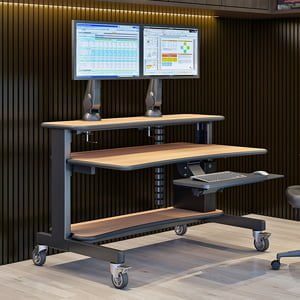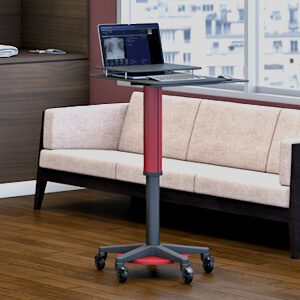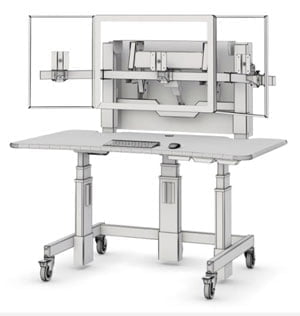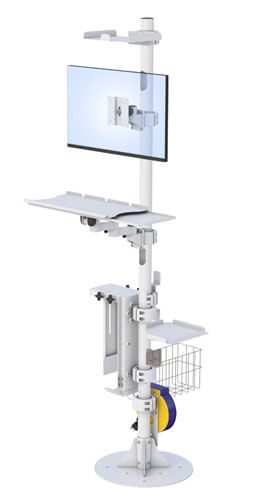The Scary Effects of Sitting Too Much
BY Author: Hristina Byrnes – The Active Times
The Following is a List of the Scary Effects of Sitting Too Much The price of leading an inactive lifestyle. Most people spend about half the day sitting. The body is not primed to be in one position for too long.
Anxiety
A study has found that sitting for too long may also harm people’s mental health. Researchers collected data from 3,367 government employees. They each filled out a psychological assessment for 4 weeks. There was a significant relationship between mental health and sitting. Those who reported sitting for more than 6 hours a day were found to have more symptoms of anxiety than those who sat for less than 3 hours a day. Here is how running can help with anxiety.
Depression
Since sitting reduces circulation it’s harder for “feel-good hormones” to make their way to receptors. A study followed 9,000 middle-aged women and determined that those who sat longer and did not meet minimum exercise requirements suffered from depression at much higher rates compared with the women who sat less and exercised more. When it came to sitting, those who sat for more than seven hours a day were 47 percent more likely to suffer from depression than those who sat four hours or fewer.
Weak muscles
Muscles are healthiest when they are being used and challenged on a regular basis. Keep them engaged. Muscles are pliable but when locked in sitting position for the majority of the day, every day, they do get stiff. After years of constantly sitting, the body is used to sitting and not as proficient at running, jumping or even standing.
Strained nerves
Being in a sitting position for too long causes your muscles to pull the nerves around them, which can cause pain. The nerves are pinched and you feel pain in your shoulders and lower back. Do you now understand why people who work desk jobs complain of back pain more often?
Diabetes
An increase of 22 percent – this huge numerical link between every extra 60 minutes people spend sitting and diabetes may come as a shock. A Dutch study indicates that people with type 2 diabetes spent close to half an hour more of their day on a couch or sitting at a computer than those without the illness.
Hip problems
Weakened muscles combined with poor circulation from keeping your legs still for a prolonged period of time lead to a number of leg and hip problems. Your gluteus muscles are some of the most important muscles in your legs. They are responsible for helping you keep balance. When you sit for a longtime, your glutes are at rest and doing nothing but cushioning you. As these muscles lose their tone, you may experience trouble maintaining good balance.
Osteoporosis
This affects mostly older people. Physical activity as a way to prevent osteoporosis is based on evidence that it can regulate bone maintenance and stimulate bone formation including the accumulation of mineral, in addition to strengthening muscles, improving balance, and thus reducing the overall risk of falls and fractures.
Increased risk of cancers
Sitting for long periods of time increases your risk for colon, endometrial and, possibly, lung cancer by 66 percent, according to a study, which looked at more than 4 million individuals and 68,936 cancer cases. The research found that even in physically active individuals, sitting increased the risk, and the risk worsened with each two-hour increase in sitting time.
Bad posture
When you sit for too long, it becomes difficult to maintain good posture. You will naturally begin to slouch and slump as you reposition yourself to keep comfortable. Before too long, this slouching at the desk will begin to affect your posture when you stand and walk. Poor posture doesn’t only look unattractive, but it’s painful and messes up the spine.
Heart disease
Excessive sitting has been linked to increased risk of heart disease. From driving in your car to sitting in your office chair and watching television on the couch, people sit more than they may realize. According to Harvard Health Publications, “some research suggests that it has harmful effects on sugar and fat metabolism, both of which affect a person’s risk of diabetes and heart disease, says Dr. I-Min Lee, a professor of medicine at Harvard Medical School.”
Fat is stored
LPL, or lipoprotein lipase, is an enzyme that breaks down fat and uses it as energy. When the enzyme isn’t working as it should, that fat is stored. In a study, mice were tested for LPL levels in three states—laying down for most of the day, standing for most of the day and exercising. LDL activity in the laying mice was very low, levels rose more than 10 times when the mice simply stood. The larger point is that people can’t combat the effects of sitting with a half hour or hour of exercise alone—standing throughout the day is the answer.
Obesity
In a study on weight gain and loss, where every aspect of diet and exercise was controlled in a lab, researchers added 1,000 calories to all of the subjects daily diets. None of the people were permitted to exercise, but some people in the study were able to maintain their weight, while others gained weight. The researchers couldn’t understand why some were able to avoid gaining weight without exercise. Those who maintained their weight did so by unintentionally moving more throughout the day.
Premature aging
Sitting too much has been linked to various health concerns, some of which include metabolic syndrome and high blood pressure. According to Dr. Mercola, “the more hours you spend sitting in a day, the shorter your lifespan may be. One study found, for instance, that reducing the average time you spend sitting down to less than three hours a day could increase your life expectancy by two years.”
Overproductive pancreas
Cells in muscles that have not been moving don’t respond well to insulin, according to a study. The result is the pancreas making more and more, which can lead to diabetes. Interrupting sitting time with short bouts of light- or moderate-intensity walking lowers glucose and insulin levels in overweight and obese adults.
Chronic fatigue & Chronic Pain
It is common knowledge that people who work out on a regular basis have more energy. In fact, cancer patients’ symptoms improved when they began exercising more, a study shows. Other research suggests that light exercise reduced feelings of fatigue by as much as 65 percent and boosted energy levels by 20 percent. Weight gain combined with poor posture inevitably leads to issues with chronic pain. When you sit for too long, the muscles in your back and neck tense up and before you know it, you’ll be Auto Control computers ( ECM PCM ECU ) suffering from serious aches and pains throughout your shoulders, neck and back.
Deep Vein Thrombosis (DVT)
Deep vein thrombosis is a health complication in which dangerous blood clots form in the large veins of your legs. Sometimes, pieces of these clots can break away from the clot itself and be pumped into the narrow blood vessels of the lungs. The risk of complications caused by deep vein thrombosis is highest in people who fly often, sit for prolonged periods of time, smoke and are pregnant.
Varicose veins
Sitting or standing for long periods of time can cause blood to pool in the leg veins, increasing the pressure within the veins, according to Johns Hopkins Medicine. As a result, the veins can stretch, which may weaken the walls of the veins and damage the valves. Symptoms of varicose veins include skin color changes, sores, a rash, and/or a burning sensation in the legs.
Progress from exercising gone
A few weeks of inactivity can cost you all the progress you’ve made. The more often you take breaks of inactivity, the faster you regress with each one. Your endurance level and cardio-health are the first victims. New York SEO Services They start to go out the window in no more than two weeks. Then you’re back to your inactivity levels in no time. According to studies that amount of oxygen people can uptake and use dives within a month of not training.
Weight gain
One of the more obvious and faster-hitting consequences of sitting too much is that it’s really easy to gain weight. This doesn’t only affect the way you look and feel, but if you gain enough weight to be classified as obese, you’re putting yourself at risk for a number of serious health complications.
Slower brain function
Studies have found that interrupting prolonged sitting with light-intensity walking breaks may be an effective fatigue countermeasure acutely. The brain is technically a muscle and needs to be exercised. Good blood flow to muscles, including the brain, makes the body and mind work better.



























